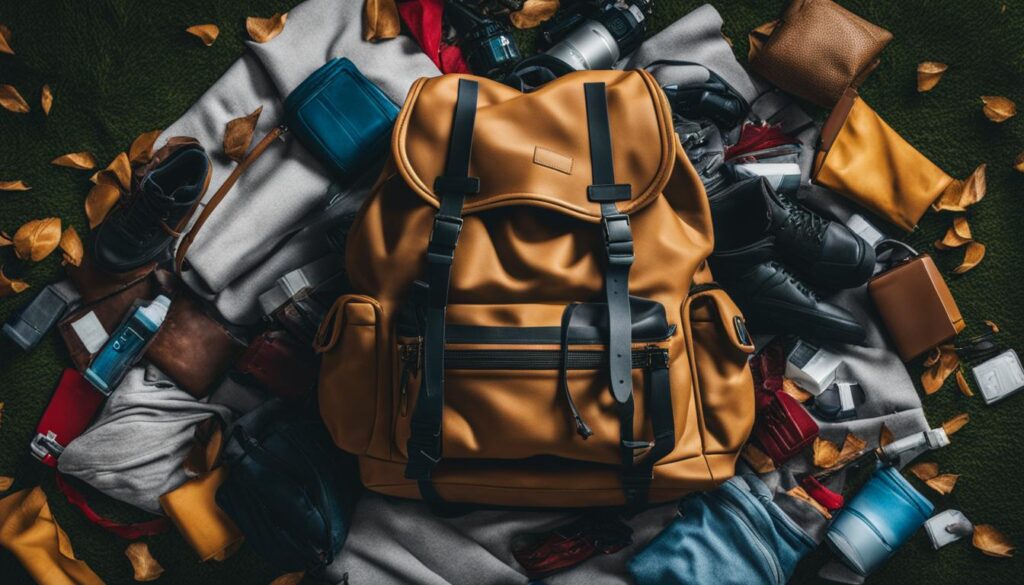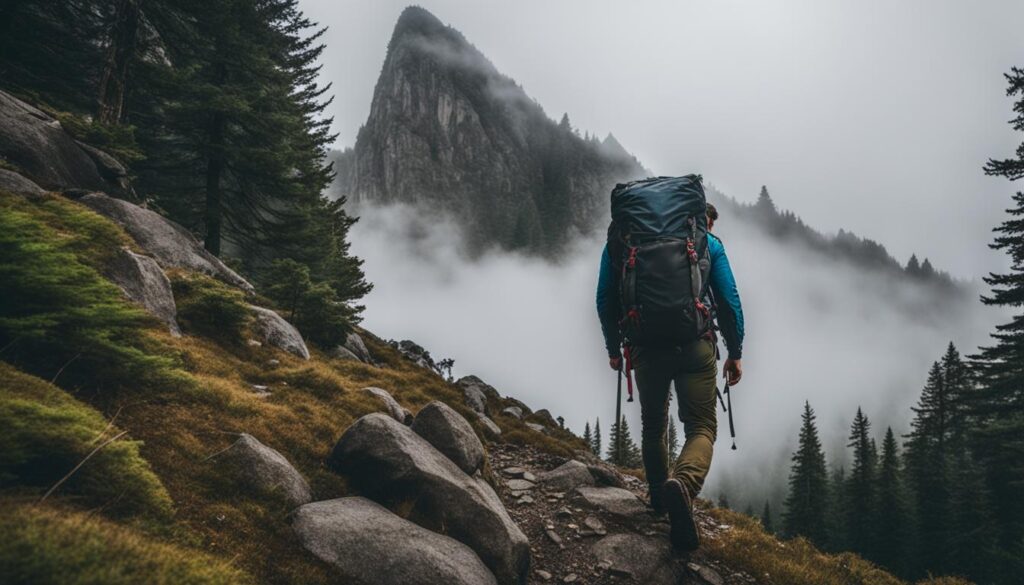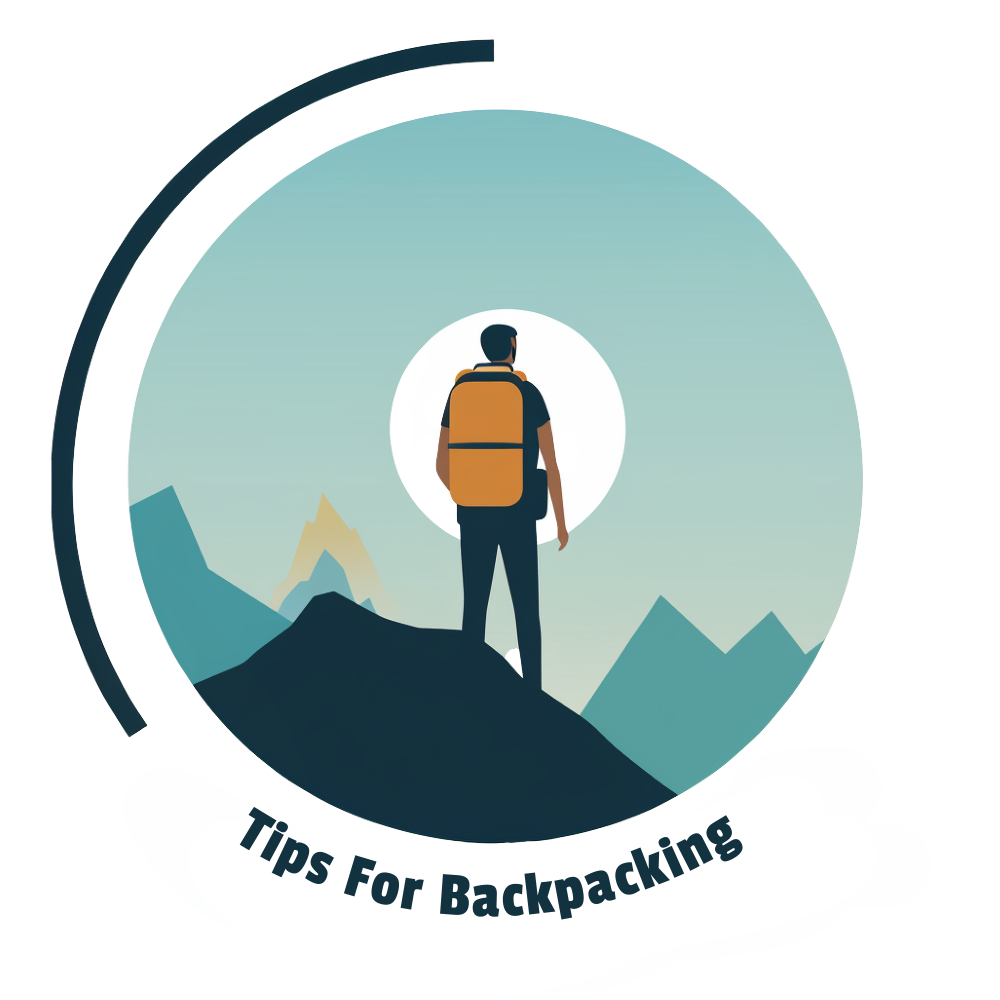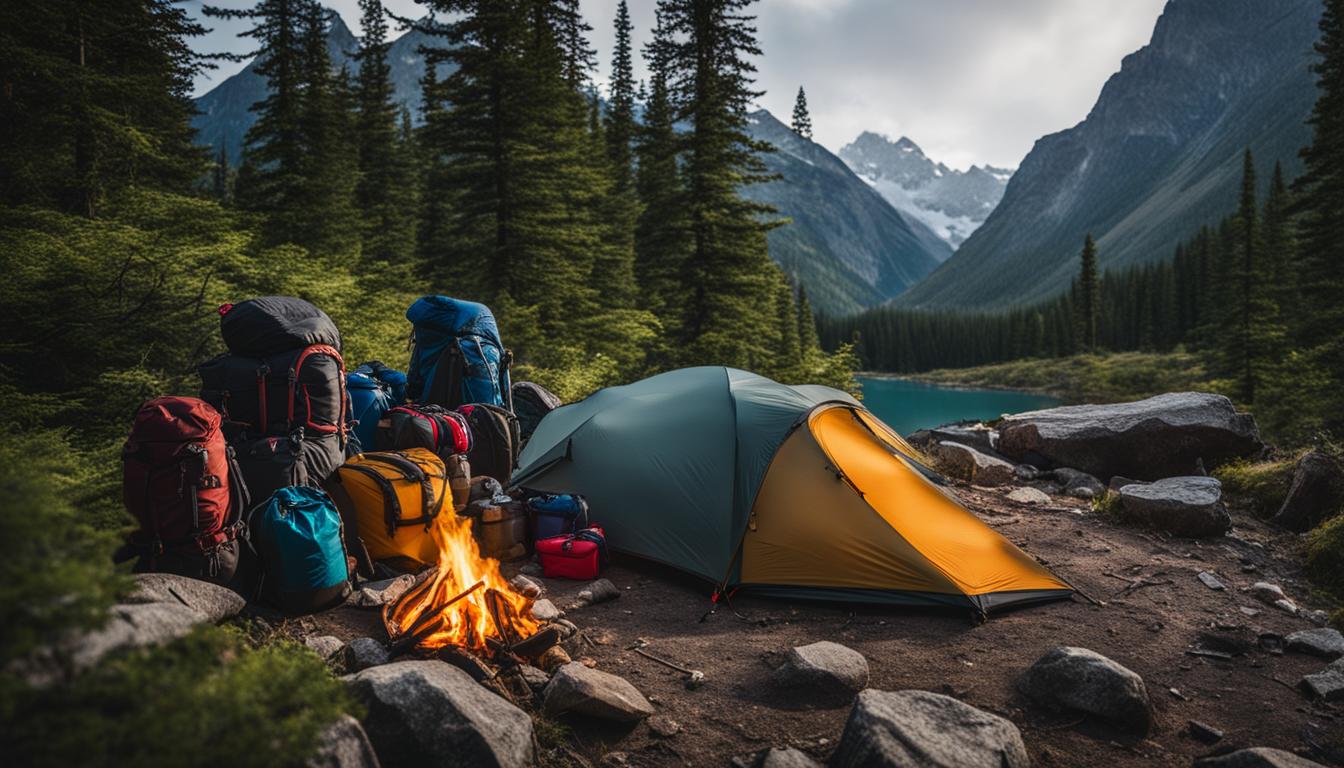Embarking on your first overnight backpacking trip can be an exhilarating and nerve-wracking adventure. As you gear up for this exciting outdoor experience, it’s important to be well-prepared and equipped with the right knowledge and essentials. From choosing the perfect hiking equipment to planning your camping preparation, here are some essential backpacking tips to ensure a successful and enjoyable trip.
Key Takeaways:
- Research and gather all the necessary backpacking essentials
- Create a hiking checklist to ensure you have everything you need
- Pack lightweight and compact gear to reduce your backpack weight
- Familiarize yourself with the trail and consider the elevation gain
- Protect your food stash from critters and wildlife
Avoiding Common Backpacking Mistakes

One of the most common mistakes made by beginner backpackers is overpacking. Carrying too much gear can make your backpack heavy and uncomfortable. It’s important to prioritize essential items and leave behind non-essential or bulky items. By reducing backpack weight, you’ll have a more enjoyable hiking experience and reduce the risk of injury or exhaustion.
Another common mistake is not properly planning your mileage. Trying to tackle too many miles in a day can lead to exhaustion, especially for beginners. It’s important to consider your fitness level and choose a trail with a manageable distance. It’s better to enjoy the journey and take breaks to appreciate the scenery rather than rushing through the hike.
When planning your backpacking trip, it’s crucial to consider elevation gain. Some trails have steep climbs that can be challenging for beginners. It’s important to choose a trail that matches your fitness level and allows you to gradually build up your endurance. By considering elevation gain, you can have a more enjoyable and manageable hiking experience.
Remember, backpacking is not only about the destination but also about the journey. Take your time, enjoy the scenery, and embrace the challenge.
Packing the Right Gear
Having the right gear is essential for a successful backpacking trip. However, it’s important to strike a balance between having the necessary equipment and not overpacking. Prioritize lightweight and multi-purpose items to save space and reduce weight. Research different gear options and read reviews to find the best fit for your needs.
Protecting your food from critters is also crucial. Bears and other wildlife are attracted to the smell of food, so it’s important to store your food in a bear-resistant container or hang it from a tree branch. This will prevent any unwelcome visitors at your campsite and ensure the safety of both you and the wildlife.
| Common Backpacking Mistakes | How to Avoid Them |
|---|---|
| Overpacking | Prioritize essential items and leave behind non-essential or bulky items. Reduce backpack weight for a more comfortable hiking experience. |
| Planning too many miles | Consider your fitness level and choose a trail with a manageable distance. Take breaks to enjoy the journey and the scenery. |
| Not considering elevation gain | Choose a trail that matches your fitness level and gradually build up your endurance. Appreciate the challenge and embrace the journey. |
| Not protecting food from critters | Store your food in a bear-resistant container or hang it from a tree branch to prevent wildlife encounters and ensure safety. |
Tips for a Successful First Solo Backpacking Trip

Gaining confidence and embarking on your first solo backpacking trip can be an exhilarating experience. While it may seem intimidating at first, there are several key tips to ensure a safe and successful adventure.
Start Small and Choose Familiar Trails
When planning your first solo backpacking trip, it’s important to start small and choose familiar trails. Opt for shorter distances to allow yourself time to adjust to the challenges of solo hiking and camping. Familiar trails also provide a sense of comfort and security, as you will have a better understanding of the terrain and potential hazards.
Know Your Limits and Pack the Right Gear
Knowing your limits is essential for a successful solo trip. Be honest with yourself about your physical fitness and backpacking experience. It’s better to choose a trip that matches your abilities rather than pushing yourself too hard. Additionally, pack the right gear for the conditions and terrain you’ll encounter. Research the weather forecast and pack accordingly, ensuring you have essential equipment such as a reliable tent, sleeping bag, and cooking supplies.
Research and Plan Ahead
Before embarking on your solo adventure, thoroughly research and plan your trip. This includes familiarizing yourself with local rules and regulations, securing any necessary permits, and obtaining maps or guidebooks for the area. Knowing the trail conditions, water sources, and potential hazards will help you make informed decisions along the way.
Staying safe is paramount during a solo backpacking trip. Be sure to inform someone of your itinerary and expected return date. Carry a reliable communication device, such as a satellite messenger or personal locator beacon, in case of emergencies. Additionally, brush up on basic first aid skills and carry a well-stocked first aid kit. By taking these precautions, you’ll set yourself up for a successful and rewarding experience in the great outdoors.
Conclusion
Preparing for your first overnight backpacking trip can be a bit intimidating, but with the right tips and mindset, it can be a successful and enjoyable experience. By following essential tips like packing the right gear, planning appropriate mileage, and gaining confidence through smaller trips, you’ll be well-prepared for your adventure.
Remember to prioritize safety and take note of your limits. It’s important to learn basic backpacking navigational skills and familiarize yourself with reading maps and using GPS devices. These skills will help you stay on track and avoid getting lost on the trail.
With careful preparation and the right gear, your first overnight backpacking trip can be a transformative adventure that creates a lifelong love for the outdoors. So go ahead, embrace the challenge, and embark on the journey of a lifetime. Happy backpacking!
How Should I Prepare for Sudden Weather Changes During My First Overnight Backpacking Trip?
When preparing for sudden weather changes during your first overnight backpacking trip, it’s essential to pack versatile clothing, including waterproof options. Be sure to also bring a lightweight, packable shelter. Keep an eye on the forecast but be ready for unexpected shifts in weather.
FAQ
What are some common mistakes made by beginner backpackers?
Some common mistakes include overpacking, trying to tackle too many miles, not considering elevation gain, lacking basic navigational skills, and not protecting food from critters.
How can I avoid overpacking?
Prioritize essential items and leave behind non-essential or bulky items. Pack only what you truly need.
How do I plan the right mileage for my backpacking trip?
Consider your fitness level and choose a trail that matches your capabilities. Take into account the elevation gain and the difficulty level of the trail.
Why are basic navigational skills important for backpacking?
Basic navigational skills, such as reading topo maps and using GPS devices, are essential to avoid getting lost on the trail and to ensure you stay on the right path.
How can I protect my food stash from critters?
Store your food in bear-resistant containers or hang it from a tree using a bear bag. This will help prevent animals from accessing your food and potentially causing problems at your campsite.
What are some tips for a successful first solo backpacking trip?
Start small and gain confidence by choosing a familiar trail and planning a short distance trip. Opt for popular and well-marked trails for a sense of comfort and safety. Pack the right gear, research and plan your trip thoroughly, and prioritize safety by telling someone where you’re going and carrying emergency devices.

